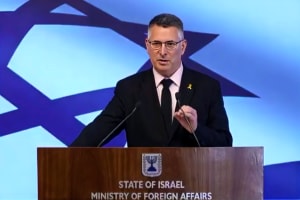Netanyahu’s message for Hamas: Don’t bet on international pressure against Israel, it's not going to work
Israeli prime minister meets with US Senator Rick Scott and a bi-partisan congressional delegation

Amid heightened tensions between Jerusalem and Washington, Israeli Prime Minister Benjamin Netanyahu met with Senator Rick Scott (R-FL) and a bipartisan U.S. Congressional delegation, organized by AIPAC.
Netanyahu and Scott discussed the latest decision by the Biden administration to abstain from a UN Security Council vote that called for an immediate ceasefire in Gaza, not contingent upon the release of hostages. The resolution passed 14-0 without the United States vetoing it.
“I thought the U.S. decision in the Security Council was a very, very bad move. The worst part about it was that it encouraged Hamas to take a hard line and to believe that international pressure will prevent Israel from freeing the hostages and destroying Hamas,” Netanyahu told Scott.
The U.S. decision prompted Netanyahu to cancel a planned delegation to Washington, that was expected to listen to American suggestions for an alternative plan in Rafah instead of a major Israeli military operation.
In his conversation with Scott, Netanyahu explained the rationale behind his move: “My decision not to send the delegation to Washington in the wake of that resolution was a message to Hamas: Don't bet on this pressure, it's not going to work. I hope they got the message.”

Both the Israeli government and military leadership are convinced that operating in the southern city of Rafah is essential to winning the war in Gaza. The Israeli military has said there are four operational Hamas battalions in Rafah, with around 7,000-8,000 terrorists in their ranks.
“We have to win. There is no substitute for victory,” Netanyahu told a bipartisan U.S. Congressional delegation.
He emphasized that the war in Gaza is intertwined with the Iranian regime's broader campaign effort to bring about the destruction of the State of Israel via its terror proxies, including Hamas in Gaza, Hezbollah in Lebanon and the Houthis in Yemen.
A few weeks ago, Netanyahu stated that Iran officially shifted from an ideological position of destroying Israel to a practical, long-term plan to bring about the destruction of the state.
This, he said, highlights the urgency of a total victory in Gaza.
“How do we achieve this victory? It doesn't nullify the other needs: How to take care of Hezbollah? How to take care of Iran? How to prevent Iran from acquiring nuclear weapons, which would make this threat a hundred times bigger? How to prevent these militias from firing into Israel rockets from Yemen or from Baghdad?” he asked. “These are big questions, but it starts with a necessary condition—and that condition is that those who launched this genocidal attack must be defeated.”
Netanyahu reiterated the three objectives of Israel’s war: To defeat the governmental and military capabilities of the Hamas terrorist organization, bring Israel's hostages back home from Gaza and ensure that Hamas will never pose a threat to Israel again.
He emphasized the importance of bi-partisan support to accomplish the mission.
The Israeli premier told the Congressmen: "It's very important for us to maintain bipartisan support at all times, but especially in these trying times. I want to use this opportunity of our conversation to try to straighten out and also dispel some of the things that are being said about our bipartisan alliance and the importance of maintaining it.”
The delegation included Brad Schneider (D-IL), Jim Costa (D-CA), Debbie Lesko (R-AZ), Juan Vargas (D-CA), Valerie Foushee (D-NC), Kathy Manning (D-NC), Marilyn Strickland (D-WA), Norma Torres (D-CA) and Debbie Wasserman Schultz (D-FL), as well as senior AIPAC officials.

The All Israel News Staff is a team of journalists in Israel.













